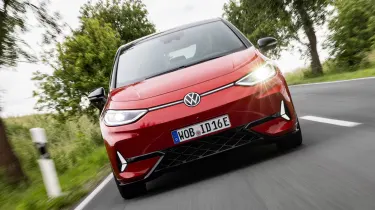
The Volkswagen ID.3 and ID.4 are destined for a major overhaul in 2026 that Volkswagen says will feature a brand new design language in a similar mould to the ID.2All concept.
Considered a ‘reskin’ of the existing models, both will use the same MEB platform as they do now, but feature considerable updates to the design, technology and interior.
Speaking to Auto Express at the Los Angeles Auto Show, VW’s development boss Kai Grünitz told Auto Express: “We will bring a re-skin for the ID.4 and ID.3, with a completely new design language going back to where we originally came from, from a design perspective, and return to what Volkswagen is known for.”
His comments reference the future design language led by VW’s design head Andy Mindt, whose first all-new model will be the production version of the ID.2All concept, due at the end of 2025.
It sees a return to a more traditional two-box silhouette, with simple design features and a sense of solidity that many thought was missing from the first ID models.
Kai continued: “We also have a lot of improvements in terms of battery costs and performance, we will also bring new features and driver assistance functions. So there will be a huge improvement, both in terms of the cost for us, but also benefit for the customers.”
Part of this update is also a reinvention of the interior design and interfaces, with the return of some physical buttons on the dash and centre console as seen on the ID.2All concept. A solid uplift in interior quality is also on the cards.
However, while the MEB platform will be improved, it will still maintain some of its key technical elements, including a rear-drive layout and sophisticated multi-link rear suspension. The switch to front-mounted motors and more rudimentary rear suspension design will be reserved for the smaller MEB Entry models.
More concise details have yet to be revealed, the 2026 launch date does line up with a traditional seven-year model cycle for VW, but this doesn’t mean the SSP platform which was meant to replace it has been scrapped. Instead, SSP development will continue, with developments from its new joint-venture with Rivian set to be applied right from launch on the first SSP models due from 2027-onwards.
